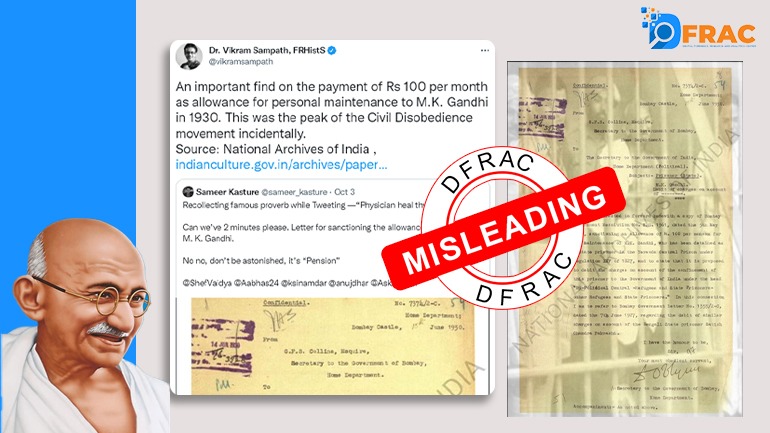Every year on 2nd October i.e on the occasion of Gandhi Jayanti, various claims are made on social media targeting the Father of the Nation, Gandhiji.
Dr. Vikram Sampath tweeted a quote and claimed, “An important find on the payment of Rs 100 per month as allowance for personal maintenance to M.K. Gandhi in 1930. This was the peak of the Civil Disobedience movement incidentally. Source: National Archives of India ,” Along with this he has also shared a link .
According to the Twitter Bio Dr. Sampath, Historian, Author of 8 books, Director @arth_live , Fellow, Archive of Indian Music etc. He has written a biography of Savarkar in two volumes.
Recollecting famous proverb while Tweeting —“Physician heal thyself” Can we’ve 2 minutes please. Letter for sanctioning the allowance of Rs. 100/- to M. K. Gandhi. No no, don’t be astonished, it’s ‘Pension’.”
Fact Check
We did a fact check on the internet with the help of some specific keywords in this regard. We found a tweet by , writer, and historian Ashok Pandey, in which he wrote, “Did Gandhi get a pension from the British? Watch the truth: Did #mahatmagandhi ask for allowances? Link: https://youtu.be/7IOEhQIkQ7c “
In the video on his YouTube channel, Ashok Kumar Pandey , which was captioned, “Did #gandhi ask for an allowance from the British? Did #mahatmagandhi ask for allowances?” “{English Translation}
Historian Ashok Kumar Pandey can be heard saying at 3:40 minutes in the video, “First of all, (the letter of the prisoner’s allowance) was presented as if it was new information like That is being given to him (Gandhi). The whole matter was that Gandhi was in Yerwada jail at that time. The prison authority passed a budget for Gandhi and his associates. Let me tell you one thing, if you read the biography of any person of that era, then according to every prisoner, there is some budget (for food and other necessities). Even while reading the biography of Rahul Sankrityayan, I read that many prisoners used to demand an increase in allowance. When you are living in jail, you get lentils and bread, a budget is given to meet other needs as well.”
Furthe, Ashok Kumar Pandey says that the second thing is that this is not such a thing, which has come to the notice for the first time. On 10 May 1930, Gandhi wrote a letter to Major E E Doyle of the Home Department.

In this letter Gandhiji wrote that the government has proposed to me that 100 rupees should be given for the jail expenses of me and my colleagues. I hope I don’t need it.
He further writes that you are proposing to give me all the facilities, I hope, when I am turning it down, you will not mind. I think, lakhs of people who go to bed hungry here are given such allowance after deducting their share. I have strong views on the treatment that is done in prisons. I do not agree at all with the different facilities given to the classification i.e. A grade prisoner, B grade and C grade prisoner.
Gandhi wrote that I believe that whoever is a prisoner, whether he is a murderer, it is his right that his needs are met.
Historian Ashok Pandey says that this Rs 100 was to be spent by the government on him, it was not a grant, nor money (cheque) given to his bank account. Gandhiji was arrested along with many of his associates, to whom the government had offered a prison allowance of Rs 100, which was rejected by Bapu.
Conclusion
It is clear from this fact check of DFRAC that the claim of other social media users including Dr. Vikram Sampath and Sameer Kasture that the British government used to give pension to Gandhiji is false and misleading.
Claim: The British government used to give Gandhi a pension of Rs 100 per month
Claimed by: social media users including Dr. Vikram Sampath and Sameer Kasture
Fact Check: Misleading






